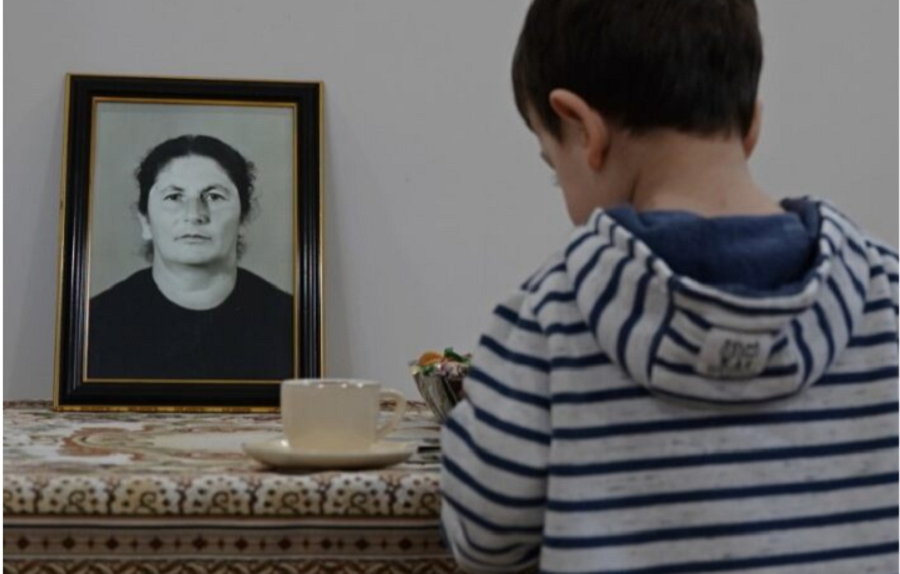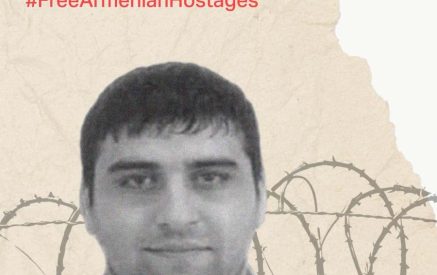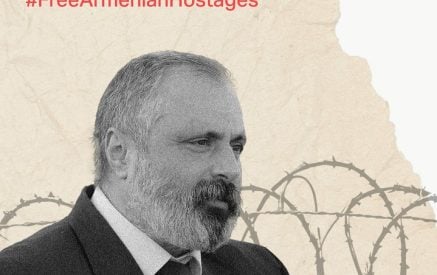YELENA DIED OF A HEART ATTACK ON THE DISPLACEMENT ROUTE
In the corner of the living room is a photograph of Yelena Sargsyan from her native village, Lusadzor. There is also the notebook she grabbed at the last moment; it contains the phone numbers of all her fellow villagers and faded letters from her grandchildren.
Yelena Sargsyan was 88 years old, the oldest in her family. Everyone in Lusadzor knew her.
Read also
For many years, she taught geography at the local school, and later became the school principal. The villagers knew her as Teacher Sargsyan.
Grandmother Yelena died of a heart attack on the forced displacement route. Her family left Stepanakert–the capital city, in three cars on September 27.
They only took some warm clothes, food, and family photos. The cars moved slowly. The family had already been on the road for a day.
Yelena’s grandson’s wife, Mariam, recalls that their main concern on the road were the kids—how to make formula without hot water, how to get the children to safety.
Around 2 a.m., Grandmother Yelena asked for some water, drank it, and then closed her eyes. Everyone in the car thought she had fallen asleep.
We hadn’t even reached halfway. She [Yelena] was very restless, she kept asking, ‘When will we get there? Where are we now?’ Throughout the journey, she neither wanted to eat nor drink; she kept repeating, ‘It’s the Adana massacres that have come to us.
- Read tne translation: Mariam Sargsyan recounts
- At the end she [Yelena] asked, “Is it still far? Haven’t we passed yet?” That was the last thing she said. She suddenly started snoring. Shirak turned around and said, “Wasn’t she just with us? Did she fall asleep?” We thought she had just fallen asleep and was snoring. I turned around and called, “Grandma, grandma!” Then Shirak stopped the car, came and took her out. It was raining, it was 2 a.m., and it was dark. We had left the convoy and stopped the car; Nona’s family was ahead of us, they noticed we had stopped and they came out too. My mother-in-law got out, the children woke up and were crying, and outside, Shirak was calling, “Grandma, grandma, get up!” Then my mother-in-law said, “It’s over, Shirak.”
After the forced displacement, the extended Sargsyan family settled in Yerevan. In a two-room apartment live Yelena’s son, his wife–Nelli, their daughter’s family with the two children, their middle son Shirak with his wife Mariam and their two sons, Daniel and Leo.
Nelli’s eldest son, Sevak, lives in Tsaghkadzor with his wife and daughter. Their second child, little Yelena, was born right after the displacement and was named in memory of the Grandmother. (The parents did not wish to display photographs of the child.)
During the Azerbaijani attack on September 19, Nelli’s sons’ families gathered with their relatives and neighbors. 20 of them, including women and children, spent two nights in a basement. The family had no information about Grandmother Yelena, who lived in Lusadzor. There was no connection. They just knew that the war had started.
Only after the ceasefire agreement did one of the sons reach Lusadzor and bring Yelena to Stepanakert. And on the following displacement route, the unfortunate incident occurred.
Family members traveling in three cars ended up in different parts of the road.
They couldn’t leave Yelena’s dead body in the same car with her grandchild.
Relatives moved the body to the back seat of the second car, arranged themselves into the next car, and made their way to the Hakari checkpoint.
Yelena’s sons was unaware of the tragedy until they reached Goris.
They describe the tightness, the rain, the traffic jam with thousands of cars, and the excruciatingly long journey with one word: hell.
Upon reaching the checkpoint, a new ordeal began—questions, inspections, and mockery from the Azerbaijani soldiers. The soldiers livestreamed from their phones, displaying the body of the 88-year-old woman, and forced to remove the cross from the car’s windshield.
- Read the transcription: Nelli Sargsyan recounts
- They come, open the door, look at grandma, make unpleasant gestures as if saying, “What is this smell?” We could see all this from the car. I was scared for my son, that he might say something wrong and they would take him, especially if they realized he was a serviceman. All sorts of thoughts come to mind. We were already crying… My son’s car had a cross hanging in it. “What is this?” they asked, “take it off.” They made him remove the cross.
After passing the checkpoint, the family tried to arrange the transportation of Yelena’s body. They still did not know where they would settle. The body was kept in Goris for several days and was finally buried in Yerevan on October 8.
Authors: Shushan Papazyan, Astghik Hovhannesov

























































